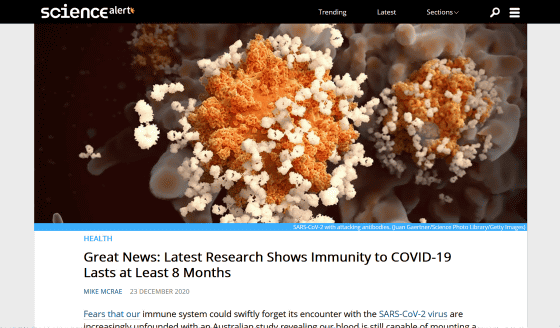Studies show that immunity to the new coronavirus lasts for at least 8 months

The new coronavirus vaccine was
Rapid generation of durable B cell memory to SARS-CoV-2 spike and nucleocapsid proteins in COVID-19 and convalescence | Science Immunology
https://immunology.sciencemag.org/content/5/54/eabf8891
COVID immunity lasts at least eight months, new data reveals
https://medicalxpress.com/news/2020-12-covid-immunity-months-reveals.html
Great News: Latest Research Shows Immunity to COVID-19 Lasts at Least 8 Months
https://www.sciencealert.com/latest-research-adds-to-evidence-immunity-covid-19-could-last-8-months-or-more

The human body attempts to eliminate antibodies against pathogens such as bacteria and viruses. However, past studies have reported that 'in the body of some patients with new coronavirus infection (COVID-19), antibodies against the virus disappeared within a few weeks after the onset', and SARS-CoV-2 immunity. Some people were worried about whether or not they could get the virus.
New research result that 'immunity of new coronavirus lasts only for a few weeks' --GIGAZINE

However, the absence of antibodies in the body does not necessarily mean that there is no immunity to the pathogen. This is because memory B cells that produce antibodies have long-term memory of several pathogens and are known to react as soon as the pathogens enter the body to produce antibodies.
For example, it is said that once infected with measles, immunity lasts for a lifetime, and tetanus can also sustain immunity for nearly 10 years with a vaccine. Therefore, a research team led by Associate Professor Menno van Zelm, who studies immunology and pathology at Monash University in Australia, conducted a study to investigate how long immunity persists in the body of a person once infected with COVID-19.
The research team collected a total of 36 blood samples from 25 COVID-19 patients during the period 4 to 242 days after onset. He also collected 36 blood samples from 36 subjects who did not develop COVID-19, and conducted a survey on each sample.

As a result of examining only the antibody in the blood sample, it is said that the antibody of SARS-CoV-2 began to decrease 20 days after the onset as in the previous study. However, as a result of introducing the SARS-CoV-2 fluorescently labeled in the blood sample, all of the original COVID-19 patients with SARS-CoV-2 spike protein and the nucleocapsid found also had to recognize memory B cells. The research team states that these SARS-CoV-2-specific memory B cells were stable until 8 months after onset.
'It's important because it shows that patients infected with SARS-CoV-2 actually have immunity to the virus and the disease,' van Zelm said of the findings. This can explain the reason why there are few cases of 're-infection with SARS-CoV-2' even though there are more than 70 million people diagnosed with COVID-19 all over the world.
At the time of writing, it is unclear how long COVID-19 immunity lasts, but future studies may show that immunity lasts much longer than eight months and lasts for several years. Van Zelm points out that the findings address concerns about the new coronavirus vaccine: 'When one or more vaccines are developed, they provide long-term protection. It gives us hope. '

Related Posts:
in Science, Posted by log1h_ik







